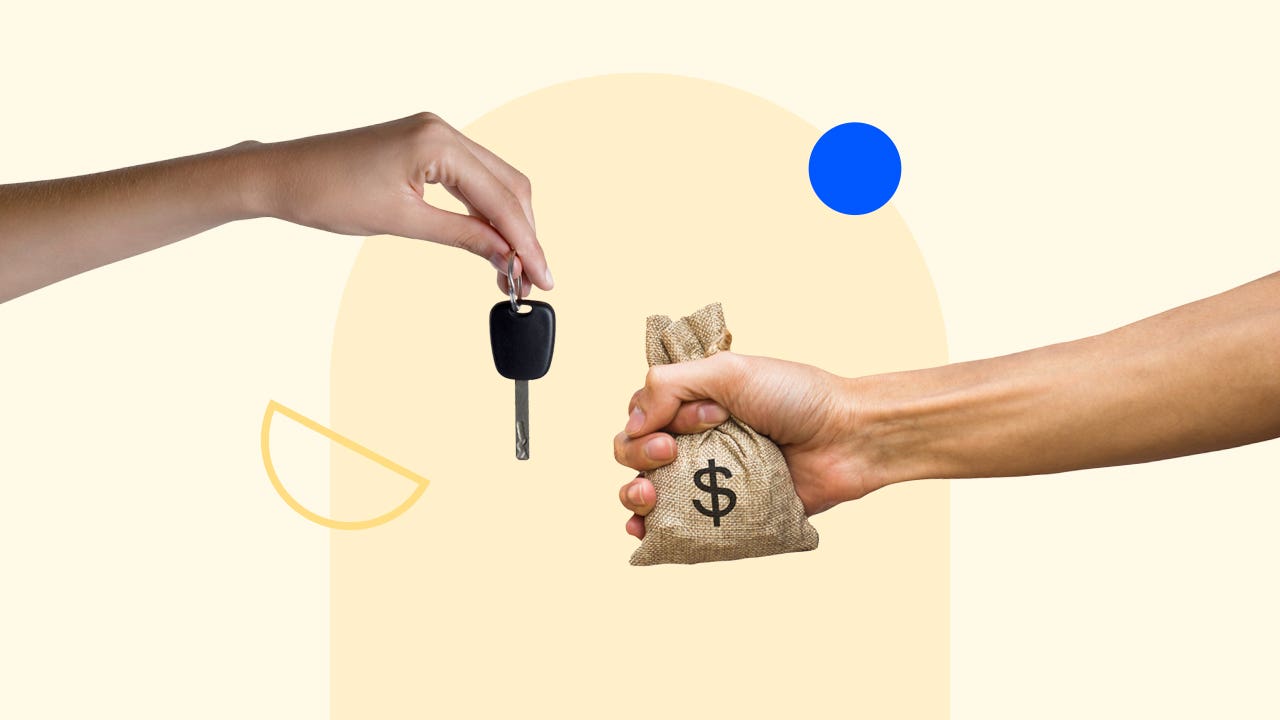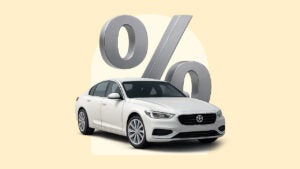Can I use my car as collateral for a loan?




Key takeaways
- A car can be used as collateral for a loan even if your credit score is low.
- Loans secured by your vehicle may come with lower rates than unsecured lenders offer.
- Car title loans can be risky and are typically smaller with higher interest rates and shorter repayment terms than auto equity loans.
- You put your car at risk of repossession with both loan types, so weigh the pros and cons carefully.
If you need extra cash and own a car with a lot of equity, you can use it as collateral for a new loan. The annual percentage rates are usually lower than unsecured loan options, but the risk is much greater since you could lose your car if you default.
The most common types of vehicle-secured loans are auto equity and car title loans. Both allow you to borrow money based on a percentage of the value of your car. While these may be a good alternative in some cases, carefully consider other options like a bad credit personal loan first. Understanding how these loans work can help you decide whether a loan on your car is worth it.
Pros and cons of using a car as collateral for a personal loan
When you offer your car as collateral for a loan, you take some of the focus off your personal financial profile. Lenders are more concerned about how much they can sell your car for if you don’t repay the loan. However, there are some distinct disadvantages of borrowing against your car that you should know before you apply.

Pros
- Easier to qualify for: You’ll have a better shot at approval, even with bad credit, since the lender can repossess your car if you default on the loan.
- Lower rates: Lenders base their rates on how likely you are to repay the debt and the value of your vehicle. Since they can recoup their losses by repossessing your car, you’ll typically receive a lower rate when using it as collateral.
- Faster approvals: Some auto equity and auto title lenders don’t conduct credit checks, potentially expediting the approval process. This means you could receive same-day funding, which can be helpful in a pinch.

Cons
- Car could be repossessed: If you fall behind on payments, the lender can legally seize your collateral to repay the debt. If the car backing the loan is your only source of transportation, losing it could wreak havoc on your life. Your credit will also be severely damaged if your credit report reflects an auto repossession.
- Higher rates than auto refinance loans: You’ll pay a higher APR than a regular auto refinance loan since you’re increasing the amount that’s secured by your car.
- The car must meet lender requirements: Not all vehicles are eligible for financing because of factors ranging from age and mileage to overall condition.
- You could end up with negative equity: Car values drop with time, and the more financing you have, the more likely you are to end up upside down. That means your car would be worth less than the loan balance, making it hard to sell or trade in for a new car.
If you have enough equity in your vehicle to meet a lender’s requirements, you may still be able to use the vehicle as collateral even when you owe money on it. If your car is worth more money than the balance of the loan debt, you have equity in the vehicle that may serve as valuable collateral.
Help us shape the future of personal finance
We’re building something new to make rate shopping smarter and simpler. Join our waitlist to get early access, share your feedback, and unlock exclusive offers.
Priority rate alerts
Exclusive member offers
Time saving
Limited spots remaining
You're signed up!
Now, help us personalize your experience. Answering the next few questions will ensure you receive the most relevant tips and offers.
What are you looking for?
Tell us which products you are in the market for
What do you already have?
Tell us which products you already have
Tell us a bit more about you.
Are you a homeowner?
Tell us about your financial situation
What is your FICO credit score
One more thing
What is your annual income?
Stay tuned to see what we're building
You're all set! We're gearing up to share something big. You'll hear from us soon with what's next.
Types of loans that use your car as collateral
Auto equity and car title loans are two types of bad credit personal loans that use your car as collateral. Some personal loans can also be secured by a vehicle. These are often considered decent emergency loan options because of their fast funding timelines. Each has different approval requirements and repayment terms you should consider before choosing one or the other.
Secured personal loans
A secured loan is a personal loan that requires collateral — in this case, a vehicle — in exchange for borrow,wing money. Because the loan is backed by collateral, it can be easier to qualify. Plus, that lower risk means lenders may be willing to extend a more competitive interest rate. However, there are very few lenders that offer secured personal loans, so you may be stuck choosing between options that don’t quite fit your needs.
Auto equity loans
You can borrow an auto equity loan even if you still owe money on your current car loan. Your loan is based on the difference between what you owe and what your car is worth, known as your “equity.” So, if your vehicle is worth $20,000, and you still owe $12,000, you have $8,000 in equity.
Auto equity loans often have lower interest rates and longer terms than car title loans. However, not many banks offer auto equity loans, so you may have a hard time finding this type of financing. It will also result in having two loans — your original auto loan and the auto equity loan — which could complicate your repayment schedule.
Cash-out refinancing
If you have equity in your vehicle, you could be eligible for a cash-out auto refinance. It lets you swap your current car loan for a larger new one, generally with different terms than you currently have, and receive the difference in cash.
The amount of cash you can pull out varies by lender, but it’s generally determined by the amount of equity you currently have in your vehicle and your credit rating. Although this option may seem attractive, it’s risky as you could find yourself upside-down on your auto loan.
Like the other options on this list, not many lenders offer this cash-out refinancing. But unlike auto equity loans, you will only have one loan to manage, so it may be a simplified option that allows you to choose a new lender through the traditional auto refinance process.
Car title loans
A car title loan is also known as a “pink slip loan” or “title pawn” loan. With this type of loan, you receive a loan secured by the title to your car. The lender effectively owns a percentage of your vehicle until you repay the loan.
Loan amounts are typically small and only made against vehicles that are paid off. You can typically only borrow between 25 and 50 percent of your car’s value. Interest rates are normally very high, with some lenders charging an annual percentage rate (APR) of over 300 percent. In addition to the high cost, most lenders require you to repay the balance in 15 to 30 days — an extremely quick timeline that few borrowers are able to manage.
Car title loans are akin to payday loans in this way, making them an especially risky option. So, they should only be used as a last resort if you need fast funding.
Bottom line
Borrowing against your car should always be a last resort. Before you use your car as collateral for a loan, see if a trusted friend or relative is willing to help out. Check your budget to see if you can save up the funds and pay cash instead of taking out a loan.
If a loan is the best — or only — option, shop rates and terms with a handful of lenders. Take extra time to compare each lender’s interest rates, repayment terms, and fees to get the best deal. Bad credit loan rates may be high, but these loans are less risky than payday or title loan options.
Why we ask for feedback Your feedback helps us improve our content and services. It takes less than a minute to complete.
Your responses are anonymous and will only be used for improving our website.
You may also like

Is car loan interest tax deductible?

Can a car loan be denied after approval?



